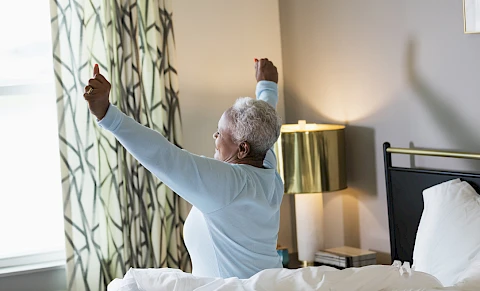
As we welcome the new year, it's an excellent time to focus on improving sleep habits. Quality sleep is vital for both physical and mental health, playing a significant role in how we feel, think, and function each day. Uncover practical tips that can help seniors enhance their sleep in the new year, leading to better health and overall well-being.
The Importance of Quality Sleep
Sleep is not just a time for rest; it's necessary for health. It helps repair the body, supports brain function, and maintains emotional balance. For seniors, quality sleep can lead to improved memory, sharper concentration, and a more stable mood. It can also boost energy levels and promote longevity. By making small changes to prioritize quality sleep, seniors can see significant improvements in their daily lives.
Creating a Sleep-Friendly Environment
One of the first steps to better sleep is crafting a sleep-friendly environment. Start with the bedroom:
- Choose a comfortable mattress and pillows that support the body.
- Use blackout curtains to keep the room dark and cue your body that it's time to sleep.
- Regulate the room temperature—a cooler room can enhance sleep quality.
- Minimize noise and light disturbances by removing electronic devices and using earplugs or white noise machines if necessary.
A peaceful and comfortable sleeping space can make a world of difference.
Establishing a Steady Bedtime Routine
Just like children, adults benefit from routines. Establishing a bedtime routine can signal to the body that it's time to wind down. Consider activities like meditation, reading, or gentle stretching, to relax both the body and mind. Keep a steady sleep schedule by heading to bed at the same time each night and waking up at the same time each morning. Weekends are no exception. This helps adjust and maintain your body's internal clock. With a routine, getting to sleep and staying asleep becomes easier.
Addressing Common Sleep Issues in Seniors
Sleep issues can be more common with age. Conditions like insomnia, sleep apnea, and restless leg syndrome can affect sleep quality. If these issues persist, consult a healthcare provider who can guide appropriate treatments or therapies. Lifestyle changes, such as a consistent routine and a healthy sleep environment, can also help manage these problems. Don't hesitate to seek help if sleep issues interfere with daily life.
Diet and Lifestyle Adjustments for Better Sleep
Your diet and daily habits can impact sleep significantly. To promote better sleep, avoid caffeine and alcohol close to bedtime, as they can disrupt sleep cycles. Try to eat lighter meals in the evening to prevent discomfort. Engage in regular physical activity, which can help you fall asleep faster and enjoy deeper sleep. Get exposure to natural light during the day, as it helps keep the sleep-wake cycle on track. Simple changes in diet and lifestyle can help improve sleep quality.
The Role of Technology in Sleep
While beneficial, technology can be a sleep disruptor if not managed properly. The blue light from screens can interfere with the body's ability to prepare for sleep. Try to reduce screen time at least an hour before bedtime. Instead, engage in calming activities to help transition to sleep more smoothly. Being mindful of technology use can lead to better sleep outcomes.
Start the Year Rested and Rejuvenated
Quality sleep is required to maintain health and well-being. By adopting these New Year's resolutions, seniors can enjoy improved rest, leading to better energy, mood, and overall health. Start making these changes today for a more restful tomorrow. If you or a loved one needs personalized support, don't hesitate to contact us at Senior Helpers Reading. We are here to help seniors in Newmanstown, Morgantown, Reading, Reinholds, and Robesonia live their best lives with better sleep.